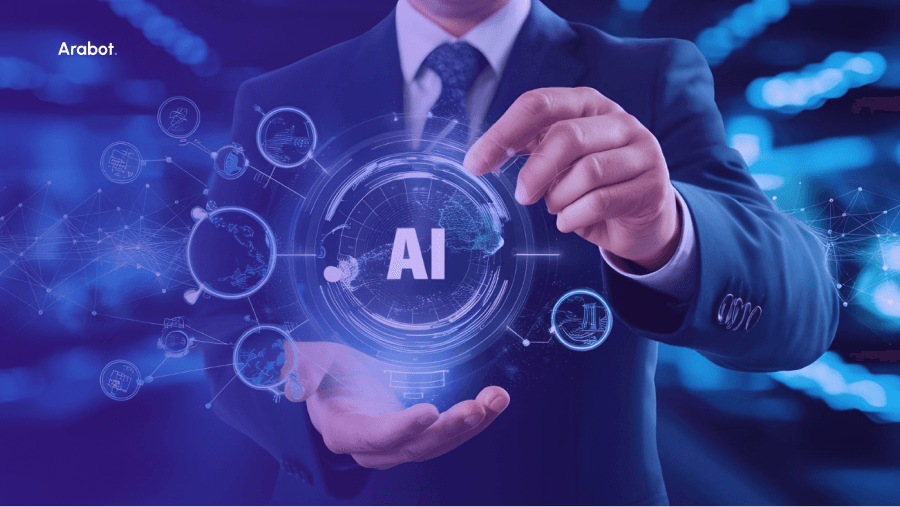- 1.
Understanding AI as a Service in Customer Service
- 2.
The Benefits of AIaaS in Customer Service
- 3.
Current Adoption Trends
- 4.
The Impact on Human Customer Service Agents
- 5.
Evolving roles and responsibilities
- 6.
New skills required in the AI-driven landscape
- 7.
Collaboration between AI and human agents
- 8.
Personalization and Customer Experience
- 9.
How AIaaS enables tailored interactions
- 10.
Improving customer experience across touchpoints
- 11.
Predictive customer service
- 12.
Industries Leading the AIaaS Revolution
- 13.
E-commerce
- 14.
Banking and Finance
- 15.
Telecommunications
- 16.
Healthcare
AI Automation
The Rise of AI as a Service: The Future of Customer Service is Automation and Why You Need to Adapt Now

Businesses are constantly seeking ways to enhance their customer service while optimizing costs and efficiency. Enter AI as a Service (AIaaS) in customer service – a game-changing solution that's revolutionizing how companies interact with their customers.
AIaaS in customer service refers to the use of artificial intelligence technologies, such as chatbots, virtual assistants, and predictive analytics, delivered through cloud-based platforms. These AI-powered tools can handle a wide range of customer inquiries, from simple FAQs to complex problem-solving, often without human intervention.
The importance of adapting to this technology cannot be overstated. As customer expectations continue to rise, businesses that fail to embrace AIaaS risk falling behind their competitors. By leveraging AI in customer service, companies can:
- Provide 24/7 support without increasing staffing costs
- Handle a higher volume of inquiries simultaneously
- Offer personalized experiences at scale
- Reduce response times and improve customer satisfaction
- Free up human agents to focus on more complex, high-value tasks
AIaaS isn't just a passing trend – it's the future of customer interactions. Companies that adapt quickly and effectively to this technology will be well-positioned to thrive in an increasingly competitive marketplace.
Understanding AI as a Service in Customer Service
AI as a Service (AIaaS) in customer service refers to the use of cloud-based artificial intelligence technologies to enhance and automate customer support functions. This model allows businesses to leverage sophisticated AI capabilities without the need for extensive in-house development or infrastructure.
Definition of AIaaS in the context of customer support:
AIaaS for customer service typically includes:
- AI-powered chatbots and virtual assistants
- Natural Language Processing (NLP) for understanding customer queries
- Machine learning algorithms for personalized responses
- Predictive analytics for anticipating customer needs
- Automated ticket routing and prioritization
These AI tools are delivered via cloud platforms, allowing businesses to access and scale AI capabilities as needed.
Comparison with traditional customer service models:
Availability and Response Time:
- AIaaS: Offers 24/7 availability with instant responses
- Traditional: Limited by human working hours, potentially leading to delays
Scalability:
- AIaaS: Can handle large volumes of inquiries simultaneously without additional staffing
- Traditional: Requires hiring and training more staff to handle increased volumes
Consistency:
- AIaaS: Provides consistent responses across interactions
- Traditional: May vary based on individual agent knowledge and experience
Personalization:
- AIaaS: Utilizes data analytics for personalized interactions at scale
- Traditional: Relies on human intuition and manual data lookup for personalization
Handling Complex Queries:
- AIaaS: Excels at routine inquiries but may struggle with complex or nuanced issues
- Traditional: Better equipped to handle complex, empathy-requiring situations
Cost Efficiency:
- AIaaS: Higher initial investment but lower long-term operational costs
- Traditional: Lower upfront costs but higher ongoing expenses for staffing and training
Continuous Improvement:
- AIaaS: Learns and improves from each interaction through machine learning
- Traditional: Improvement depends on manual feedback loops and training
Human Touch:
- AIaaS: May lack empathy in certain situations
- Traditional: Provides a human connection and emotional understanding
The ideal approach often involves a hybrid model, combining AIaaS with human agents to leverage the strengths of both. This allows businesses to automate routine tasks while maintaining the human touch for complex issues, creating a more efficient and effective customer service ecosystem.
The Benefits of AIaaS in Customer Service
Implementing AI as a Service (AIaaS) in customer service offers numerous advantages that can significantly enhance a company's operations and customer experience. Let's explore the key benefits:
Cost savings
AIaaS can lead to substantial cost reductions for businesses:
- Reduced staffing needs: AI-powered chatbots and virtual assistants can handle a large volume of routine inquiries, reducing the need for human agents.
- Lower training costs: AI systems don't require ongoing training like human employees do.
- Decreased operational expenses: With AI handling many tasks, businesses can operate with smaller physical call centers and reduced infrastructure costs.
Efficiency improvements
AIaaS dramatically enhances operational efficiency:
- Faster query resolution: AI can instantly access vast amounts of data to provide quick, accurate responses.
- Automated task handling: Routine tasks like appointment scheduling or order tracking can be fully automated.
- Improved workflow: AI can prioritize and route complex queries to the most appropriate human agents.
Enhanced customer satisfaction
AIaaS contributes to higher customer satisfaction levels:
- Consistent service quality: AI provides uniform responses, eliminating human inconsistencies.
- Personalized interactions: AI can analyze customer data to offer tailored recommendations and solutions.
- Reduced wait times: With AI handling multiple queries simultaneously, customers experience shorter wait times.
24/7 availability and instant responses
One of the most significant advantages of AIaaS is its round-the-clock availability:
- Always-on support: AI systems can provide customer service at any time, catering to global customers across different time zones.
- Instant responses: Customers receive immediate answers to their queries, even during peak hours or holidays.
- Scalability during high-demand periods: AI can handle sudden spikes in customer inquiries without the need for additional staffing.
By leveraging AIaaS in customer service, businesses can significantly improve their operational efficiency, reduce costs, and enhance customer satisfaction. The ability to provide instant, personalized, and consistent support around the clock gives companies a competitive edge in today's fast-paced, customer-centric business environment.
Current Adoption Trends
The adoption of AI as a Service (AIaaS) in customer service is experiencing rapid growth, with businesses across various industries recognizing its potential to transform customer interactions and operational efficiency.
- Statistics on businesses implementing AIaaS:
According to recent studies, 84% of executives are already using AI technology to interact with customers. This high adoption rate demonstrates the growing recognition of AI's value in enhancing customer engagement. Furthermore, 79% of customer service professionals view AI and automation as valuable tools for their strategy, with slightly higher adoption rates in B2B (56%) compared to B2C (54%) sectors.
In the retail sector, 63% of retailers are leveraging AI to improve customer interactions, with 40% dedicating specific teams and budgets to AI technology implementation. The banking and finance sector is also seeing significant adoption, with 46% of financial institutions using AI reporting improved customer experiences.
- Projected growth and investment in the technology:
The AIaaS market is experiencing exponential growth. In 2023, the market was valued at $9.86 billion, and it is anticipated to reach $14.27 billion in 2024, showcasing a remarkable compound annual growth rate (CAGR) of 44.7%. Looking further ahead, projections indicate that the market could soar to $63.2 billion by 2028, maintaining a CAGR of 45.1%.
Investment in AI technologies is also on an upward trajectory. By the end of 2024, it's estimated that enterprises will spend more than $100 billion on AI solutions and infrastructure[6]. This substantial investment underscores the confidence businesses have in AI's potential to deliver significant returns.
The customer service sector, in particular, is seeing increased AI investment. In 2023, 20% of C-level customer care executives significantly invested in AI technology, with 70% planning to increase their investment in 2024[5]. The top areas for AI funding in support teams include AI-powered bots (44%), user behavior analysis (42%), and knowledge base enhancement (29%).
These statistics clearly indicate that AIaaS adoption in customer service is not just a passing trend but a fundamental shift in how businesses approach customer interactions. As more companies recognize the benefits of AI in improving efficiency, reducing costs, and enhancing customer experiences, we can expect to see continued growth and investment in this technology in the coming years.
The Impact on Human Customer Service Agents
The integration of AI into customer service is reshaping the roles and responsibilities of human agents, requiring new skills and fostering a collaborative environment between AI and human workers.
Evolving roles and responsibilities
As AI takes over routine and repetitive tasks, human agents are transitioning into more complex and value-added roles:
- Problem-solving specialists: Agents now focus on resolving intricate issues that require human judgment and empathy.
- Customer experience enhancers: Human agents are becoming pivotal in elevating the overall customer experience by providing personalized, empathetic interactions.
- AI supervisors: Agents are increasingly responsible for overseeing and fine-tuning AI systems, ensuring they operate effectively and ethically.
- Strategic advisors: With AI handling data analysis, human agents can leverage insights to offer strategic advice to customers and contribute to business improvements.
New skills required in the AI-driven landscape
To thrive in this evolving environment, customer service agents need to develop new competencies:
- Technical proficiency: Understanding AI systems, data analysis, and digital tools is becoming essential.
- Emotional intelligence: As AI handles routine inquiries, human agents must excel in empathy, active listening, and building rapport.
- Adaptability: The ability to quickly learn new technologies and adjust to changing roles is crucial.
- Critical thinking: Agents need to interpret AI-generated insights and apply them to complex customer situations.
- Collaboration skills: Working effectively alongside AI systems requires strong teamwork and communication abilities.
Collaboration between AI and human agents
The future of customer service lies in the synergy between AI and human agents:
- Complementary strengths: AI excels at data processing and quick responses, while humans provide nuanced understanding and emotional support.
- Seamless handoffs: Effective systems allow for smooth transitions between AI and human agents when issues escalate or require a personal touch.
- Continuous learning loop: Human agents provide feedback to improve AI systems, while AI offers insights to enhance human performance.
- Enhanced decision-making: AI provides real-time data and suggestions, empowering human agents to make more informed decisions.
By embracing these changes, customer service teams can create a powerful hybrid model that leverages the strengths of both AI and human agents, ultimately delivering superior customer experiences and driving business success.
Personalization and Customer Experience
AI as a Service (AIaaS) is revolutionizing how businesses approach personalization and customer experience. By leveraging advanced AI capabilities, companies can create more tailored, predictive, and satisfying interactions across all customer touchpoints.
How AIaaS enables tailored interactions
AIaaS empowers businesses to deliver highly personalized experiences by:
- Analyzing vast amounts of customer data to identify patterns and preferences
- Creating detailed customer profiles based on past behaviors and interactions
- Generating real-time, contextual recommendations and offers
- Adapting content and messaging to individual customer needs
For example, an e-commerce platform using AIaaS might analyze a customer's browsing history, purchase patterns, and demographic information to provide personalized product recommendations, tailored email campaigns, and customized website experiences.
Improving customer experience across touchpoints
AIaaS enhances the customer experience across various channels by:
- Ensuring consistency in messaging and service across all platforms
- Providing 24/7 support through AI-powered chatbots and virtual assistants
- Optimizing the user interface based on individual preferences and behaviors
- Facilitating seamless transitions between different touchpoints (e.g., from mobile app to website to in-store)
A multi-channel retailer might use AIaaS to create a unified customer profile that informs interactions whether the customer is shopping online, in-store, or through a mobile app, ensuring a cohesive and personalized experience throughout the customer journey.
Predictive customer service
One of the most powerful applications of AIaaS is in predictive customer service:
- Anticipating customer needs before they arise
- Identifying potential issues and proactively offering solutions
- Optimizing resource allocation by predicting peak service times
- Personalizing support based on customer history and preferences
For instance, a telecommunications company might use AIaaS to predict when a customer is likely to experience service issues based on usage patterns and network data. The company could then proactively reach out to the customer with solutions, preventing frustration and improving satisfaction.
By leveraging AIaaS for personalization and predictive service, businesses can significantly enhance the overall customer experience, leading to increased loyalty, higher customer lifetime value, and improved operational efficiency.
Industries Leading the AIaaS Revolution
AI as a Service (AIaaS) is transforming customer service across multiple industries. Here's how AI-powered customer service agents are being leveraged in four key sectors:
E-commerce
E-commerce companies are at the forefront of adopting AI customer service agents to enhance the shopping experience:
- 24/7 Support: AI chatbots provide round-the-clock assistance, answering product queries and handling order status inquiries.
- Personalized Recommendations: AI analyzes customer browsing and purchase history to offer tailored product suggestions.
- Visual Search: Some e-commerce platforms use AI-powered image recognition to allow customers to search for products by uploading photos.
For example, Amazon's recommendation engine uses AI to analyze customer behavior and suggest relevant products, significantly boosting conversion rates.
Banking and Finance
Financial institutions are leveraging AI agents to improve customer service and streamline operations:
- Virtual Assistants: AI-powered assistants like Bank of America's Erica help customers with account inquiries, financial advice, and transaction support.
- Fraud Detection: AI systems analyze transaction patterns in real-time to identify and prevent fraudulent activities.
- Loan Processing: Some banks use AI to streamline loan application reviews, speeding up the approval process.
JPMorgan Chase, for instance, employs AI to analyze transaction patterns and flag potential fraudulent activities in real-time, enhancing security for customers.
Telecommunications
Telecom companies are using AI agents to improve customer support and network management:
- Automated Troubleshooting: AI chatbots guide customers through basic troubleshooting steps for common issues.
- Predictive Maintenance: AI analyzes network data to forecast potential outages and take preventive measures.
- Personalized Plans: AI systems recommend tailored service plans based on individual usage patterns.
AT&T uses AI to predict network issues and optimize traffic routing, improving service quality for customers.
Healthcare
In healthcare, AI agents are enhancing patient care and administrative efficiency:
- Appointment Scheduling: AI chatbots help patients book appointments and send reminders.
- Symptom Checkers: AI-powered tools provide initial assessments of symptoms and guide patients to appropriate care.
- Medication Management: AI assists in tracking prescriptions and sending refill reminders.
For example, Babylon Health uses AI to provide initial health assessments and triage patients to appropriate care levels, improving access to healthcare services.
Across these industries, AI customer service agents are not only improving efficiency and reducing costs but also enhancing the overall customer experience by providing faster, more personalized, and more accessible support.
The rise of AI as a Service (AIaaS) in customer service is not just a trend—it's a fundamental shift in how businesses interact with their customers.
arabot's success in developing intelligent chatbots that understand and respond to Arabic language naturally highlights the growing importance of AIaaS in customer service. By leveraging advanced natural language processing and machine learning technologies, arabot has enabled businesses across various sectors—from e-commerce to telecommunications—to automate customer interactions and service fulfillment at scale.
The importance of AIaaS in customer service cannot be overstated:
- It provides 24/7 availability, ensuring customers receive support whenever they need it.
- It offers consistent and personalized interactions, improving overall customer satisfaction.
- It significantly reduces operational costs while increasing efficiency.
- It allows human agents to focus on more complex, high-value tasks.
The time to act is now. Whether you're a small business or a large enterprise, integrating AIaaS into your customer service strategy is no longer optional—it's essential for staying competitive in today's fast-paced, customer-centric business environment.
Book a demo now!
© 2016 - 2026 copyright Arabot. All rights reserved.
 Insurance
Insurance Healthcare
Healthcare Automative
Automative Hospitality
Hospitality Banking
Banking Government
Government Telecommunication
Telecommunication Education
Education Human Resources
Human Resources
